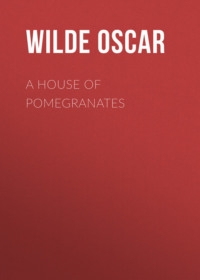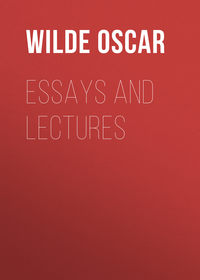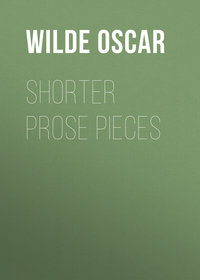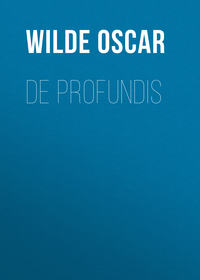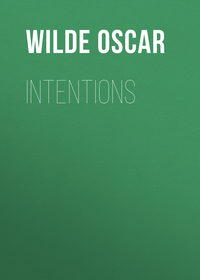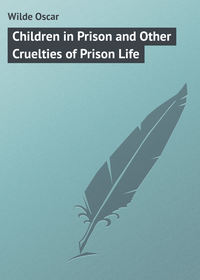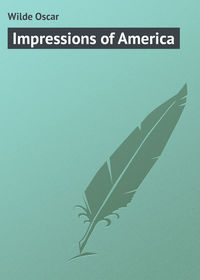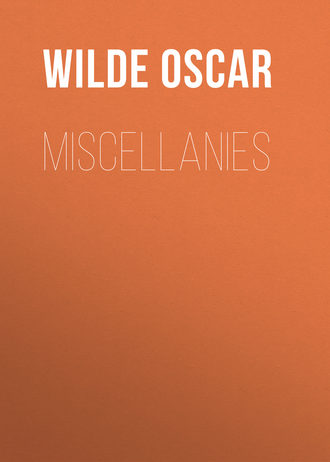 полная версия
полная версияMiscellanies
There are many advantages in puppets. They never argue. They have no crude views about art. They have no private lives. We are never bothered by accounts of their virtues, or bored by recitals of their vices; and when they are out of an engagement they never do good in public or save people from drowning, nor do they speak more than is set down for them. They recognise the presiding intellect of the dramatist, and have never been known to ask for their parts to be written up. They are admirably docile, and have no personalities at all. I saw lately, in Paris, a performance by certain puppets of Shakespeare’s Tempest, in M. Maurice Boucher’s translation. Miranda was the mirage of Miranda, because an artist has so fashioned her; and Ariel was true Ariel, because so had she been made. Their gestures were quite sufficient, and the words that seemed to come from their little lips were spoken by poets who had beautiful voices. It was a delightful performance, and I remember it still with delight, though Miranda took no notice of the flowers I sent her after the curtain fell. For modern plays, however, perhaps we had better have living players, for in modern plays actuality is everything. The charm – the ineffable charm – of the unreal is here denied us, and rightly.
Suffer me one more correction. Your writer describes the author of the brilliant fantastic lecture on ‘The Modern Actor’ as a protégé of mine. Allow me to state that my acquaintance with Mr. John Gray is, I regret to say, extremely recent, and that I sought it because he had already a perfected mode of expression both in prose and verse. All artists in this vulgar age need protection certainly. Perhaps they have always needed it. But the nineteenth-century artist finds it not in Prince, or Pope, or Patron, but in high indifference of temper, in the pleasure of the creation of beautiful things, and the long contemplation of them, in disdain of what in life is common and ignoble and in such felicitous sense of humour as enables one to see how vain and foolish is all popular opinion, and popular judgment, upon the wonderful things of art. These qualities Mr. John Gray possesses in a marked degree. He needs no other protection, nor, indeed, would he accept it. – I remain, Sir, your obedient servant, OSCAR WILDE.
LADY WINDERMERE’S FAN: AN EXPLANATION
(St. James’s Gazette, February 27, 1892.)
To the Editor of the St. James’s Gazette.
SIR, – Allow me to correct a statement put forward in your issue of this evening to the effect that I have made a certain alteration in my play in consequence of the criticism of some journalists who write very recklessly and very foolishly in the papers about dramatic art. This statement is entirely untrue and grossly ridiculous.
The facts are as follows. On last Saturday night, after the play was over, and the author, cigarette in hand, had delivered a delightful and immortal speech, I had the pleasure of entertaining at supper a small number of personal friends; and as none of them was older than myself I, naturally, listened to their artistic views with attention and pleasure. The opinions of the old on matters of Art are, of course, of no value whatsoever. The artistic instincts of the young are invariably fascinating; and I am bound to state that all my friends, without exception, were of opinion that the psychological interest of the second act would be greatly increased by the disclosure of the actual relationship existing between Lady Windermere and Mrs. Erlynne – an opinion, I may add, that had previously been strongly held and urged by Mr. Alexander.
As to those of us who do not look on a play as a mere question of pantomime and clowning psychological interest is everything, I determined, consequently, to make a change in the precise moment of revelation. This determination, however, was entered into long before I had the opportunity of studying the culture, courtesy, and critical faculty displayed in such papers as the Referee, Reynolds’, and the Sunday Sun.
When criticism becomes in England a real art, as it should be, and when none but those of artistic instinct and artistic cultivation is allowed to write about works of art, artists will, no doubt, read criticisms with a certain amount of intellectual interest. As things are at present, the criticisms of ordinary newspapers are of no interest whatsoever, except in so far as they display, in its crudest form, the Bœotianism of a country that has produced some Athenians, and in which some Athenians have come to dwell. – I am, Sir, your obedient servant,
OSCAR WILDE.
February 26.
SALOMÉ
(Times, March 2, 1893.)
To the Editor of the Times.
SIR, – My attention has been drawn to a review of Salomé which was published in your columns last week.9 The opinions of English critics on a French work of mine have, of course, little, if any, interest for me. I write simply to ask you to allow me to correct a misstatement that appears in the review in question.
The fact that the greatest tragic actress of any stage now living saw in my play such beauty that she was anxious to produce it, to take herself the part of the heroine, to lend to the entire poem the glamour of her personality, and to my prose the music of her flute-like voice – this was naturally, and always will be, a source of pride and pleasure to me, and I look forward with delight to seeing Mme. Bernhardt present my play in Paris, that vivid centre of art, where religious dramas are often performed. But my play was in no sense of the words written for this great actress. I have never written a play for any actor or actress, nor shall I ever do so. Such work is for the artisan in literature – not for the artist. – I remain, Sir, your obedient servant,
OSCAR WILDE.
THE THIRTEEN CLUB
(Times, January 16, 1894.)
At a dinner of the Thirteen Club held at the Holborn Restaurant on January 13, 1894, the Chairman (Mr. Harry Furniss) announced that from Mr. Oscar Wilde the following letter had been received: —
I have to thank the members of your Club for their kind invitation, for which convey to them, I beg you, my sincere thanks. But I love superstitions. They are the colour element of thought and imagination. They are the opponents of common sense. Common sense is the enemy of romance. The aim of your Society seems to be dreadful. Leave us some unreality. Do not make us too offensively sane. I love dining out, but with a Society with so wicked an object as yours I cannot dine. I regret it. I am sure you will all be charming, but I could not come, though 13 is a lucky number.
THE ETHICS OF JOURNALISM
I(Pall Mall Gazette, September 20, 1894.)
To the Editor of the Pall Mall Gazette.
SIR, – Will you allow me to draw your attention to a very interesting example of the ethics of modern journalism, a quality of which we have all heard so much and seen so little?
About a month ago Mr. T. P. O’Connor published in the Sunday Sun some doggerel verses entitled ‘The Shamrock,’ and had the amusing impertinence to append my name to them as their author. As for some years past all kinds of scurrilous personal attacks had been made on me in Mr. O’Connor’s newspapers, I determined to take no notice at all of the incident.
Enraged, however, by my courteous silence, Mr. O’Connor returns to the charge this week. He now solemnly accuses me of plagiarising the poem he had the vulgarity to attribute to me.10
This seems to me to pass beyond even those bounds of coarse humour and coarser malice that are, by the contempt of all, conceded to the ordinary journalist, and it is really very distressing to find so low a standard of ethics in a Sunday newspaper. – I remain, Sir, your obedient servant,
OSCAR WILDE.
September 18.
II(Pall Mall Gazette, September 25, 1894.)
To the Editor of the Pall Mall Gazette.
SIR, – The assistant editor of the Sunday Sun, on whom seems to devolve the arduous duty of writing Mr. T. P. O’Connor’s apologies for him, does not, I observe with regret, place that gentleman’s conduct in any more attractive or more honourable light by the attempted explanation that appears in the letter published in your issue of today. For the future it would be much better if Mr. O’Connor would always write his own apologies. That he can do so exceedingly well no one is more ready to admit than myself. I happen to possess one from him.
The assistant editor’s explanation, stripped of its unnecessary verbiage, amounts to this: It is now stated that some months ago, somebody, whose name, observe, is not given, forwarded to the office of the Sunday Sun a manuscript in his own handwriting, containing some fifth-rate verses with my name appended to them as their author. The assistant editor frankly admits that they had grave doubts about my being capable of such an astounding production. To me, I must candidly say, it seems more probable that they never for a single moment believed that the verses were really from my pen. Literary instinct is, of course, a very rare thing, and it would be too much to expect any true literary instinct to be found among the members of the staff of an ordinary newspaper; but had Mr. O’Connor really thought that the production, such as it is, was mine, he would naturally have asked my permission before publishing it. Great licence of comment and attack of every kind is allowed nowadays to newspapers, but no respectable editor would dream of printing and publishing a man’s work without first obtaining his consent.
Mr. O’Connor’s subsequent conduct in accusing me of plagiarism, when it was proved to him on unimpeachable authority that the verses he had vulgarly attributed to me were not by me at all, I have already commented on. It is perhaps best left to the laughter of the gods and the sorrow of men. I would like, however, to point out that when Mr. O’Connor, with the kind help of his assistant editor, states, as a possible excuse for his original sin, that he and the members of his staff ‘took refuge’ in the belief that the verses in question might conceivably be some very early and useful work of mine, he and the members of his staff showed a lamentable ignorance of the nature of the artistic temperament. Only mediocrities progress. An artist revolves in a cycle of masterpieces, the first of which is no less perfect than the last.
In conclusion, allow me to thank you for your courtesy in opening to me the columns of your valuable paper, and also to express the hope that the painful exposé of Mr. O’Connor’s conduct that I have been forced to make will have the good result of improving the standard of journalistic ethics in England. – I remain, Sir, your obedient servant,
OSCAR WILDE.
WORTHING, September 22.
THE GREEN CARNATION
(Pall Mall Gazette, October 2, 1894.)
To the Editor of the Pall Mall Gazette.
SIR, – Kindly allow me to contradict, in the most emphatic manner, the suggestion, made in your issue of Thursday last, and since then copied into many other newspapers, that I am the author of The Green Carnation.
I invented that magnificent flower. But with the middle-class and mediocre book that usurps its strangely beautiful name I have, I need hardly say, nothing whatsoever to do. The flower is a work of art. The book is not. – I remain, Sir, your obedient servant, OSCAR WILDE.
WORTHING, October 1.
PHRASES AND PHILOSOPHIES FOR THE USE OF THE YOUNG
(Chameleon, December 1894 )
The first duty in life is to be as artificial as possible. What the second duty is no one has as yet discovered.
Wickedness is a myth invented by good people to account for the curious attractiveness of others.
If the poor only had profiles there would be no difficulty in solving the problem of poverty.
Those who see any difference between soul and body have neither.
A really well-made buttonhole is the only link between Art and Nature.
Religions die when they are proved to be true. Science is the record of dead religions.
The well-bred contradict other people. The wise contradict themselves.
Nothing that actually occurs is of the smallest importance.
Dulness is the coming of age of seriousness.
In all unimportant matters, style, not sincerity, is the essential. In all important matters, style, not sincerity, is the essential.
If one tells the truth one is sure, sooner or later, to be found out.
Pleasure is the only thing one should live for. Nothing ages like happiness.
It is only by not paying one’s bills that one can hope to live in the memory of the commercial classes.
No crime is vulgar, but all vulgarity is crime. Vulgarity is the conduct of others.
Only the shallow know themselves.
Time is waste of money.
One should always be a little improbable.
There is a fatality about all good resolutions. They are invariably made too soon.
The only way to atone for being occasionally a little overdressed is by being always absolutely over-educated.
To be premature is to be perfect.
Any preoccupation with ideas of what is right or wrong in conduct shows an arrested intellectual development.
Ambition is the last refuge of the failure.
A truth ceases to be true when more than one person believes in it.
In examinations the foolish ask questions that the wise cannot answer.
Greek dress was in its essence inartistic. Nothing should reveal the body but the body.
One should either be a work of art, or wear a work of art.
It is only the superficial qualities that last. Man’s deeper nature is soon found out.
Industry is the root of all ugliness.
The ages live in history through their anachronisms.
It is only the gods who taste of death. Apollo has passed away, but Hyacinth, whom men say he slew, lives on. Nero and Narcissus are always with us.
The old believe everything: the middle-aged suspect everything: the young know everything.
The condition of perfection is idleness: the aim of perfection is youth.
Only the great masters of style ever succeed in being obscure.
There is something tragic about the enormous number of young men there are in England at the present moment who start life with perfect profiles, and end by adopting some useful profession.
To love oneself is the beginning of a life-long romance.
THE RISE OF HISTORICAL CRITICISM
The first portion of this essay is given at the end of the volume containing Lord Arthur Savile’s Crime and Other Prose Pieces. Recently the remainder of the original manuscript has been discovered, and is here published for the first time. It was written for the Chancellor’s English Essay Prize at Oxford in 1879, the subject being ‘Historical Criticism among the Ancients.’ The prize was not awarded. To Professor J. W. Mackail thanks are due for revising the proofs.
IVIt is evident that here Thucydides is ready to admit the variety of manifestations which external causes bring about in their workings on the uniform character of the nature of man. Yet, after all is said, these are perhaps but very general statements: the ordinary effects of peace and war are dwelt on, but there is no real analysis of the immediate causes and general laws of the phenomena of life, nor does Thucydides seem to recognise the truth that if humanity proceeds in circles, the circles are always widening.
Perhaps we may say that with him the philosophy of history is partly in the metaphysical stage, and see, in the progress of this idea from Herodotus to Polybius, the exemplification of the Comtian law of the three stages of thought, the theological, the metaphysical, and the scientific: for truly out of the vagueness of theological mysticism this conception which we call the Philosophy of History was raised to a scientific principle, according to which the past was explained and the future predicted by reference to general laws.
Now, just as the earliest account of the nature of the progress of humanity is to be found in Plato, so in him we find the first explicit attempt to found a universal philosophy of history upon wide rational grounds. Having created an ideally perfect state, the philosopher proceeds to give an elaborate theory of the complex causes which produce revolutions of the moral effects of various forms of government and education, of the rise of the criminal classes and their connection with pauperism, and, in a word, to create history by the deductive method and to proceed from a priori psychological principles to discover the governing laws of the apparent chaos of political life.
There have been many attempts since Plato to deduce from a single philosophical principle all the phenomena which experience subsequently verifies for us. Fichte thought he could predict the world-plan from the idea of universal time. Hegel dreamed he had found the key to the mysteries of life in the development of freedom, and Krause in the categories of being. But the one scientific basis on which the true philosophy of history must rest is the complete knowledge of the laws of human nature in all its wants, its aspirations, its powers and its tendencies: and this great truth, which Thucydides may be said in some measure to have apprehended, was given to us first by Plato.
Now, it cannot be accurately said of this philosopher that either his philosophy or his history is entirely and simply a priori. On est de son siècle même quand on y proteste, and so we find in him continual references to the Spartan mode of life, the Pythagorean system, the general characteristics of Greek tyrannies and Greek democracies. For while, in his account of the method of forming an ideal state, he says that the political artist is indeed to fix his gaze on the sun of abstract truth in the heavens of the pure reason, but is sometimes to turn to the realisation of the ideals on earth: yet, after all, the general character of the Platonic method, which is what we are specially concerned with, is essentially deductive and a priori. And he himself, in the building up of his Nephelococcygia, certainly starts with a καθαρος πιναξ, making a clean sweep of all history and all experience; and it was essentially as an a priori theorist that he is criticised by Aristotle, as we shall see later.
To proceed to closer details regarding the actual scheme of the laws of political revolutions as drawn out by Plato, we must first note that the primary cause of the decay of the ideal state is the general principle, common to the vegetable and animal worlds as well as to the world of history, that all created things are fated to decay – a principle which, though expressed in the terms of a mere metaphysical abstraction, is yet perhaps in its essence scientific. For we too must hold that a continuous redistribution of matter and motion is the inevitable result of the normal persistence of Force, and that perfect equilibrium is as impossible in politics as it certainly is in physics.
The secondary causes which mar the perfection of the Platonic ‘city of the sun’ are to be found in the intellectual decay of the race consequent on injudicious marriages and in the Philistine elevation of physical achievements over mental culture; while the hierarchical succession of Timocracy and Oligarchy, Democracy and Tyranny, is dwelt on at great length and its causes analysed in a very dramatic and psychological manner, if not in that sanctioned by the actual order of history.
And indeed it is apparent at first sight that the Platonic succession of states represents rather the succession of ideas in the philosophic mind than any historical succession of time.
Aristotle meets the whole simply by an appeal to facts. If the theory of the periodic decay of all created things, he urges, be scientific, it must be universal, and so true of all the other states as well as of the ideal. Besides, a state usually changes into its contrary and not to the form next to it; so the ideal state would not change into Timocracy; while Oligarchy, more often than Tyranny, succeeds Democracy. Plato, besides, says nothing of what a Tyranny would change to. According to the cycle theory it ought to pass into the ideal state again, but as a fact one Tyranny is changed into another as at Sicyon, or into a Democracy as at Syracuse, or into an Aristocracy as at Carthage. The example of Sicily, too, shows that an Oligarchy is often followed by a Tyranny, as at Leontini and Gela. Besides, it is absurd to represent greed as the chief motive of decay, or to talk of avarice as the root of Oligarchy, when in nearly all true oligarchies money-making is forbidden by law. And finally the Platonic theory neglects the different kinds of democracies and of tyrannies.
Now nothing can be more important than this passage in Aristotle’s Politics (v. 12.), which may be said to mark an era in the evolution of historical criticism. For there is nothing on which Aristotle insists so strongly as that the generalisations from facts ought to be added to the data of the a priori method – a principle which we know to be true not merely of deductive speculative politics but of physics also: for are not the residual phenomena of chemists a valuable source of improvement in theory?
His own method is essentially historical though by no means empirical. On the contrary, this far-seeing thinker, rightly styled il maestro di color che sanno, may be said to have apprehended clearly that the true method is neither exclusively empirical nor exclusively speculative, but rather a union of both in the process called Analysis or the Interpretation of Facts, which has been defined as the application to facts of such general conceptions as may fix the important characteristics of the phenomena, and present them permanently in their true relations. He too was the first to point out, what even in our own day is incompletely appreciated, that nature, including the development of man, is not full of incoherent episodes like a bad tragedy, that inconsistency and anomaly are as impossible in the moral as they are in the physical world, and that where the superficial observer thinks he sees a revolution the philosophical critic discerns merely the gradual and rational evolution of the inevitable results of certain antecedents.
And while admitting the necessity of a psychological basis for the philosophy of history, he added to it the important truth that man, to be apprehended in his proper position in the universe as well as in his natural powers, must be studied from below in the hierarchical progression of higher function from the lower forms of life. The important maxim, that to obtain a clear conception of anything we must ‘study it in its growth from the very beginning’ is formally set down in the opening of the Politics, where, indeed, we shall find the other characteristic features of the modern Evolutionary theory, such as the ‘Differentiation of Function’ and the ‘Survival of the Fittest’ explicitly set forth.
What a valuable step this was in the improvement of the method of historical criticism it is needless to point out. By it, one may say, the true thread was given to guide one’s steps through the bewildering labyrinth of facts. For history (to use terms with which Aristotle has made us familiar) may be looked at from two essentially different standpoints; either as a work of art whose τελος or final cause is external to it and imposed on it from without; or as an organism containing the law of its own development in itself, and working out its perfection merely by the fact of being what it is. Now, if we adopt the former, which we may style the theological view, we shall be in continual danger of tripping into the pitfall of some a priori conclusion – that bourne from which, it has been truly said, no traveller ever returns.
The latter is the only scientific theory and was apprehended in its fulness by Aristotle, whose application of the inductive method to history, and whose employment of the evolutionary theory of humanity, show that he was conscious that the philosophy of history is nothing separate from the facts of history but is contained in them, and that the rational law of the complex phenomena of life, like the ideal in the world of thought, is to be reached through the facts, not superimposed on them – κατα πολλων not παρα πολλα.


